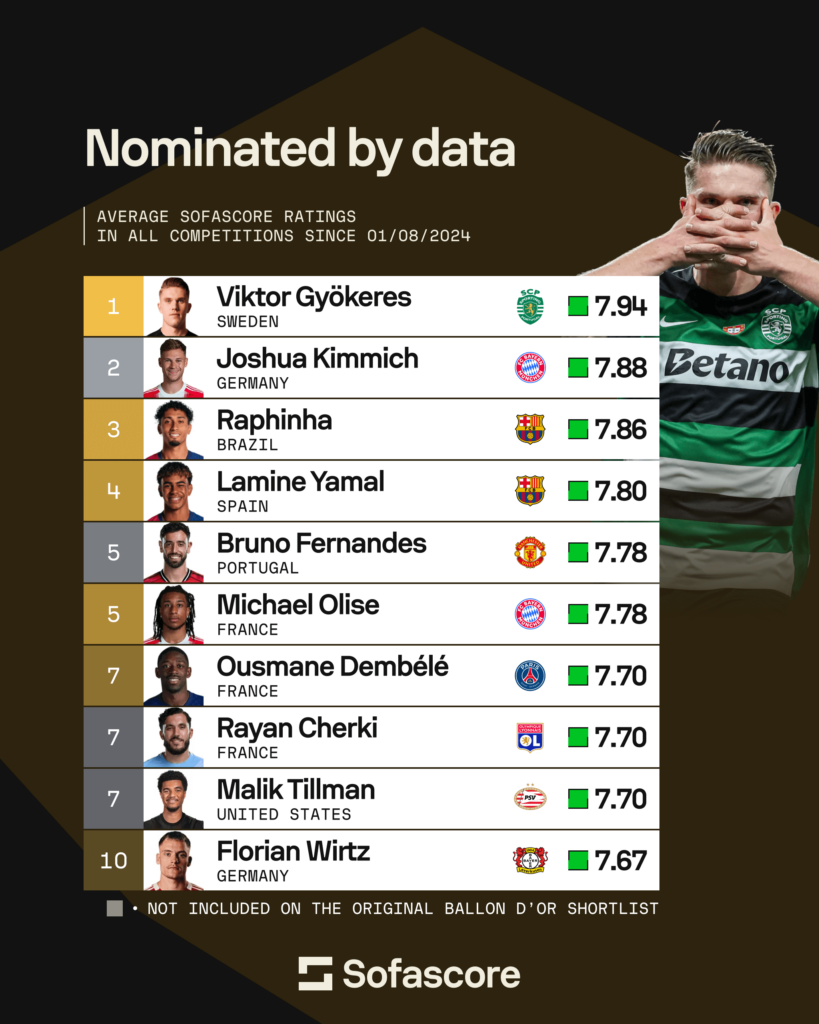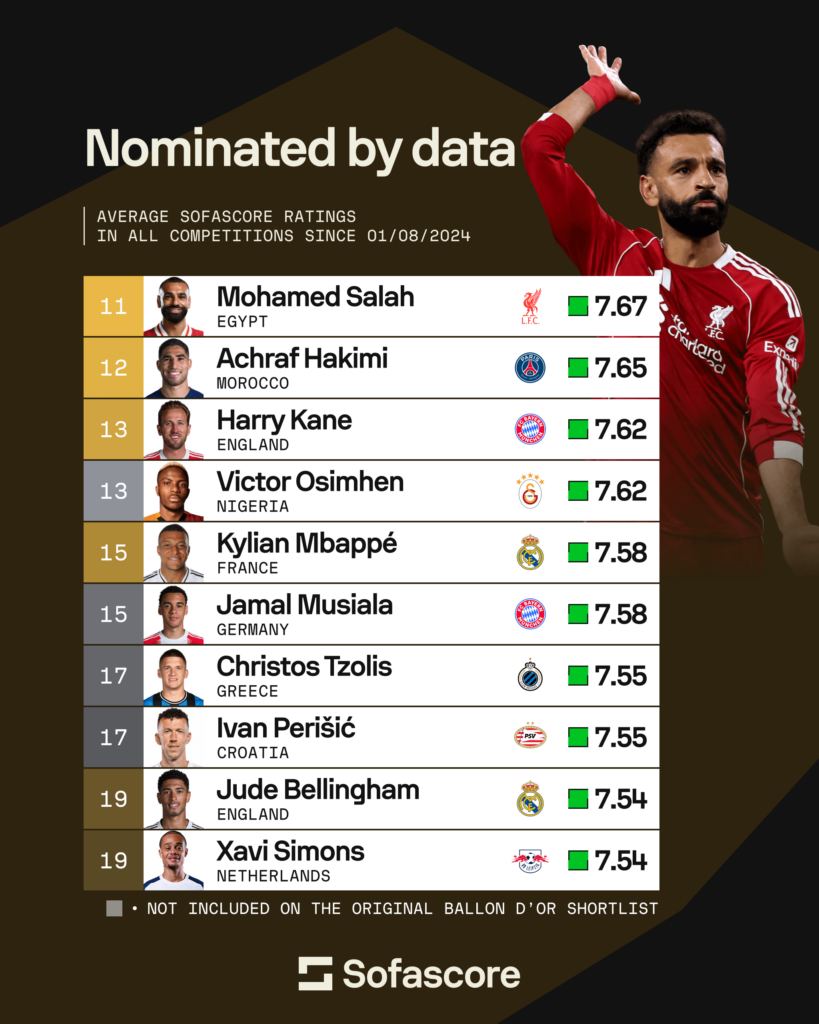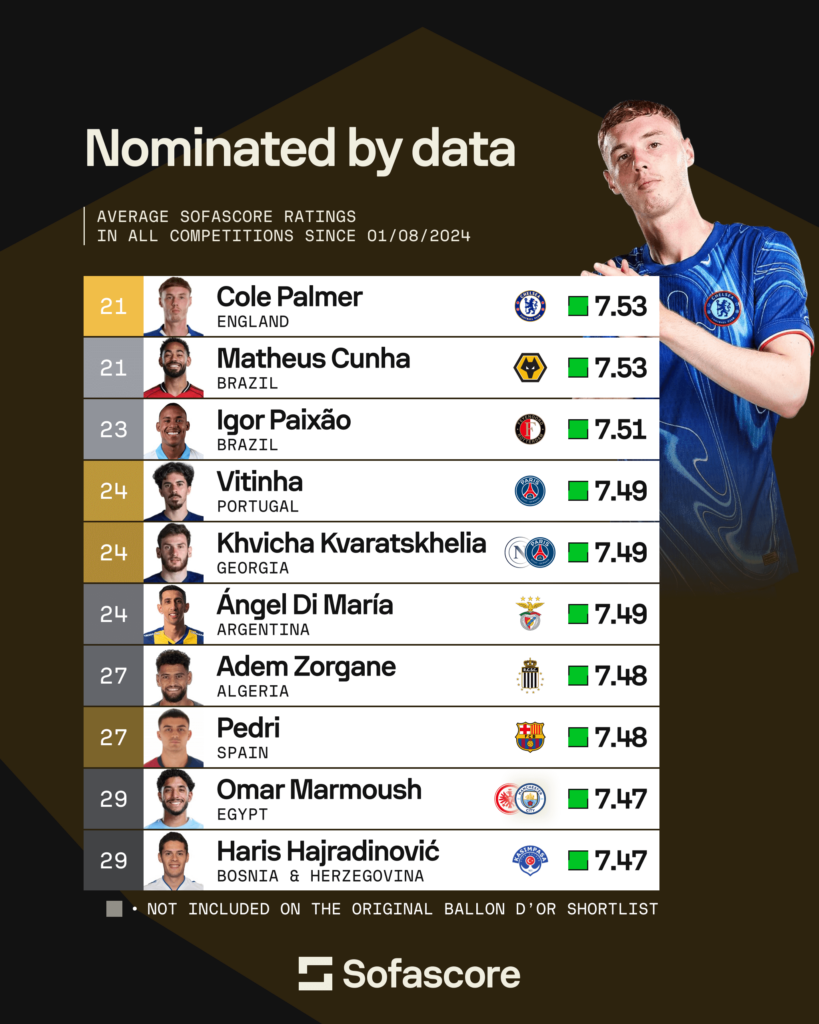It’s that time of year again.
The Ballon d’Or nominees are out, and with them comes the usual storm of media buzz, social media campaigns, and passionate debates in group chats. The shortlist is packed with global icon: some deserving, others riding legacy, narrative, or the momentum of high-profile transfers and titles.
But here’s a simple question: What if we ignored the noise and just looked at the numbers?
When we dig into objective performance data such as Sofascore’s season-long ratings across Europe’s top leagues, a few truths emerge. Some Ballon d’Or candidates absolutely belong among the best. Others… not so much. And most interestingly, several top performers didn’t even make the official shortlist.
The Numbers Speak — But Are We Listening?
Take Joshua Kimmich, for example. The Bayern Munich midfielder was, according to Sofascore, the second-best performing player across the top ten European leagues last season. Week in and week out, Kimmich was a model of consistency, dictating tempo, breaking up opposition attacks, orchestrating from deep, and rarely putting a foot wrong. His rating? A towering 7.88.
And yet, when the Ballon d’Or shortlist was announced, his name was nowhere to be found.
This isn’t an isolated case. Bruno Fernandes, Rayan Cherki, Malik Tillman, Ivan Perišić, and Victor Osimhen, all among the highest-rated players statistically, didn’t make the cut either. These are players who not only performed at a high level, but often carried their teams through difficult stretches. In some cases, they were shining lights in otherwise struggling squads.
What connects them? Incredible consistency, strong data across multiple key categories… and no Ballon d’Or nomination.



Meanwhile, some of the official nominees, without trying to shame them, posted relatively modest seasons, statistically speaking. A few ranked well below the top 50 in their respective leagues. Yet they were included, perhaps for their name recognition, or for a single standout moment that lived longer in memory than in the metrics.
So what gives?
Ballon d’Or: Prestige Meets Perception
Let’s be clear: the Ballon d’Or is not, and never has been, a purely statistical award. It’s voted on by journalists, national team captains, and coaches: people who watch, interpret, and feel football. And in many ways, that’s beautiful. Football isn’t math. It’s emotion, drama, instinct. We remember overhead kicks in finals, not pass completion in February.
But that also means the award is vulnerable to bias, reputation, and recency. Players from smaller leagues or mid-table teams are often overlooked, even if their individual performances have been exceptional. Meanwhile, high-profile names, including some who had middling seasons, are included because, well, they’re expected to be there. That’s how you end up with players being nominated for what they symbolize, rather than what they did.
This year’s list exemplifies that. There are players who undoubtedly deserve the nod such as Harry Kane, Jude Bellingham, Florian Wirtz, Mohamed Salah. They all backed up their inclusion with strong statistical seasons. But they’re sharing space with others whose inclusion feels more ceremonial than earned.
And all the while, the true statistical titans of the season remain on the outside looking in.
A Case for Objective Recognition
Let’s take a step back. What should the Ballon d’Or represent? If it’s meant to crown the best footballer over the course of a season, then surely performance must be the foundation. Yet time and again, we see the process skewed by subjectivity: who plays for the bigger club, who scored in a Champions League semifinal, who has the better media narrative.
But what happens when that narrative leaves out a player like Christos Tzolis, who posted outstanding numbers in Belgium? Or Xavi Simons, who dazzled at Leipzig and regularly featured among the best-rated players in the Bundesliga? These players aren’t headline-makers. They don’t dominate the global conversation. But they dominate games. And there’s something deeply unfair about a system that praises excellence only when it comes in a familiar shirt, in front of a global audience.
We’re not saying the Ballon d’Or should be handed out by an algorithm. That would be sterile and reductive. But it’s equally flawed to pretend that objective performance data doesn’t matter at all.
Surely there’s a middle ground.
Could There Be Another List?
Imagine if, alongside the Ballon d’Or shortlist, we also received a “Statistical XI”. A selection, of you want, of the season’s top performers based purely on data. No voting. No reputation. Just numbers. It wouldn’t compete with the Ballon d’Or, but it would complement it, offering a clearer, more balanced picture of excellence.
Football fans deserve that transparency. Because while we all love the fairy tales and emotion of the sport, we also want to know that brilliance is being recognized — even when it’s not glamorous.
It might not be a shiny gold trophy, but it would mean something. It would be a nod to the unsung heroes. The players grinding out world-class performances without the spotlight. The ones who don’t make headlines, but should.
And maybe, just maybe, it would pressure award bodies like the Ballon d’Or to look a little deeper. To see past the names and into the numbers. Because what’s the point of celebrating football’s best if we’re not even measuring them accurately?
No Malice, Just Metrics
Let’s make one thing absolutely clear: this isn’t about trashing the Ballon d’Or. It’s a prestigious, storied award with decades of history. It’s given us unforgettable moments and legendary winners. We respect what it stands for.
But that doesn’t mean it’s above scrutiny. If a player like Joshua Kimmich, with one of the most complete seasons in Europe, can’t even get a mention, something’s missing. If Ivan Perišić, who quietly orchestrated brilliance for PSV, doesn’t make the radar, there’s a disconnect. Not a scandal. Not an outrage. But a quiet injustice.
And in an age where data is more accessible and insightful than ever before, we owe it to the game to use it.
Final Thought: Celebrate, But Question
We’ll still watch the Ballon d’Or ceremony. We’ll still enjoy the suits, the speeches, the highlight reels. But maybe this year, we can also raise an eyebrow. Maybe we can cheer for the winner — while also asking why certain names were never even in the room.
Because football, like all great art, deserves multiple interpretations. And sometimes, the most honest version of the story… is written in numbers.
